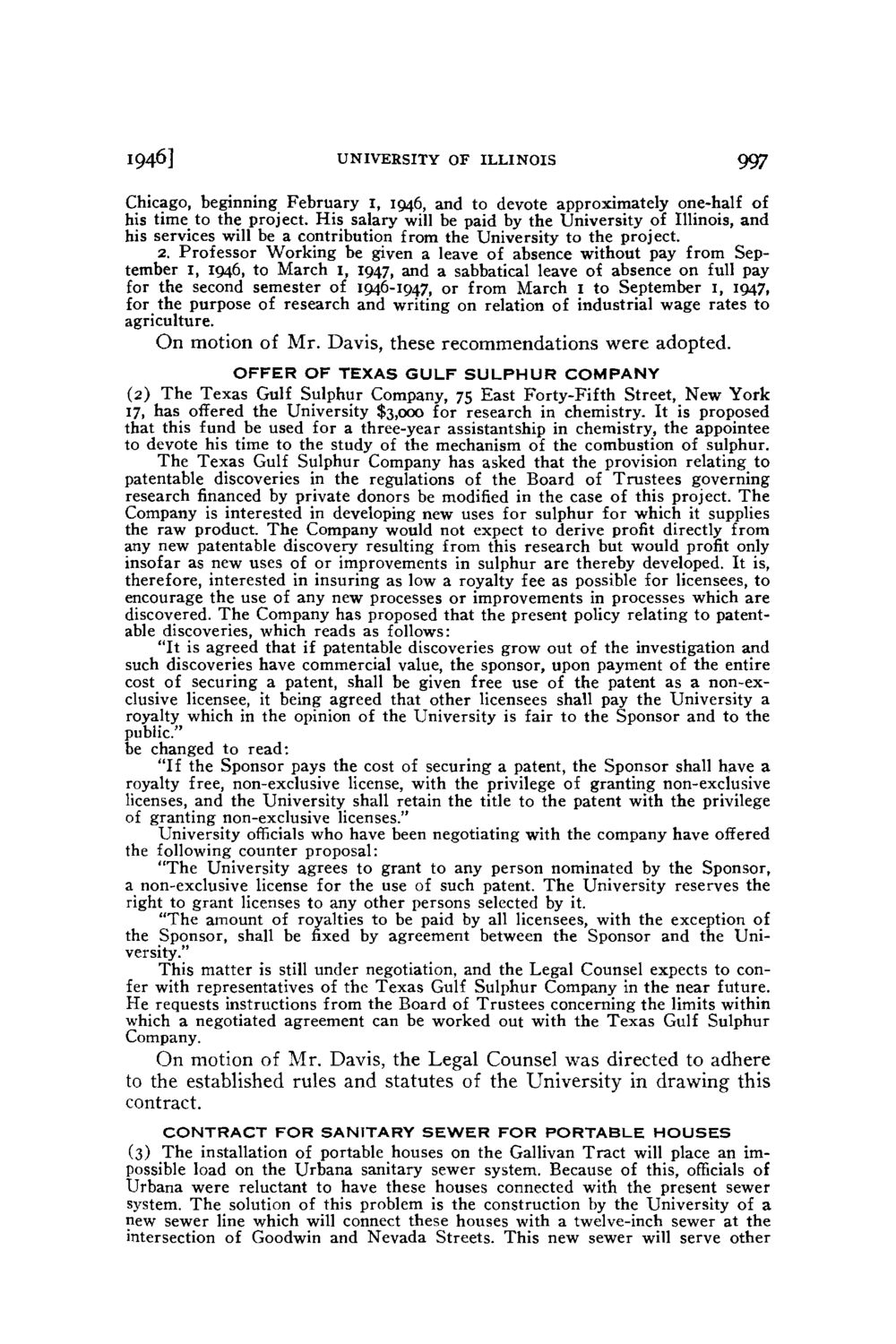| |
| |
Caption: Board of Trustees Minutes - 1946
This is a reduced-resolution page image for fast online browsing.

EXTRACTED TEXT FROM PAGE:
1946] UNIVERSITY OF ILLINOIS 997 Chicago, beginning February I, 1946, and to devote approximately one-half of his time to the project. His salary will be paid by the University of Illinois, and his services will be a contribution from the University to the project. 2. Professor Working be given a leave of absence without pay from September 1, 1046, to March 1, 1947, and a sabbatical leave of absence on full pay for the second semester of 1946-1047, or from March 1 to September 1, 1047, for the purpose of research and writing on relation of industrial wage rates to agriculture. O n m o t i o n of M r . D a v i s , t h e s e r e c o m m e n d a t i o n s w e r e a d o p t e d . OFFER OF TEXAS GULF SULPHUR COMPANY (2) T h e Texas Gulf Sulphur Company, 75 East Forty-Fifth Street, New York 17, has offered the University $3,000 for research in chemistry. It is proposed that this fund be used for a three-year assistantship in chemistry, the appointee to devote his time to the study of the mechanism of the combustion of sulphur. The Texas Gulf Sulphur Company has asked that the provision relating to patentable discoveries in the regulations of the Board of Trustees governing research financed by private donors be modified in the case of this project. T h e Company is interested in developing new uses for sulphur for which it supplies the raw product. T h e Company would not expect to derive profit directly from any new patentable discovery resulting from this research but would profit only insofar as new uses of or improvements in sulphur are thereby developed. It is, therefore, interested in insuring as low a royalty fee as possible for licensees, to encourage the use of any new processes or improvements in processes which are discovered. T h e Company has proposed that the present policy relating to patentable discoveries, which reads as follows: "It is agreed that if patentable discoveries grow out of the investigation and such discoveries have commercial value, the sponsor, upon payment of the entire cost of securing a patent, shall be given free use of the patent as a non-exclusive licensee, it being agreed that other licensees shall pay the University a royalty which in the opinion of the University is fair to the Sponsor and to the public." be changed to read: "If the Sponsor pays the cost of securing a patent, the Sponsor shall have a royalty free, non-exclusive license, with the privilege of granting non-exclusive licenses, and the University shall retain the title to the patent with the privilege of granting non-exclusive licenses." University officials who have been negotiating with the company have offered the following counter proposal: "The University agrees to grant to any person nominated by the Sponsor, a non-exclusive license for the use of such patent. T h e University reserves the right to grant licenses to any other persons selected by it. "The amount of royalties to be paid by all licensees, with the exception of the Sponsor, shall be fixed by agreement between the Sponsor and the University." This matter is still under negotiation, and the Legal Counsel expects to confer with representatives of the Texas Gulf Sulphur Company in t h e near future. He requests instructions from the Board of Trustees concerning the limits within which a negotiated agreement can be worked out with the Texas Gulf Sulphur Company. O n m o t i o n of M r . D a v i s , t h e L e g a l C o u n s e l w a s d i r e c t e d t o a d h e r e to t h e e s t a b l i s h e d r u l e s a n d s t a t u t e s of t h e U n i v e r s i t y i n d r a w i n g t h i s contract. CONTRACT FOR SANITARY SEWER FOR PORTABLE HOUSES (3) The installation of portable houses on the Gallivan Tract will place an impossible load on the Urbana sanitary sewer system. Because of this, officials of Urbana were reluctant to have these houses connected with the present sewer system. T h e solution of this problem is the construction by the University of a new sewer line which will connect these houses with a twelve-inch sewer at the intersection of Goodwin and Nevada Streets. This new sewer will serve other
| |